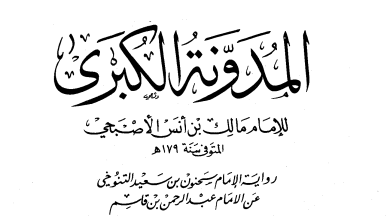Classical scholars on following the Four Sunni Schools of law (Hanafi, Maliki, Shafi’i, Hanbali)
Here follows some quotes from classical scholars on the need to adhere (taqlid) to one of the Four Sunni Schools of law (Hanafi, Maliki, Shafi’i or Hanbali) for all those who have not reached the level of valid Ijtihad which is of the highest rank of true Islamic scholarship:
[1] Imam Jalal al-Din al-Suyuti (d. 911 AH) said: “The difference found in the four Schools of Islamic law (Hanafi, Shafi’i, Maliki and Hanbali) in this nation is a huge blessing and an enormous virtue. It has a subtle hidden wisdom the intelligent are able to grasp, but the ignorant are blind of. I have even heard some of them say: ‘The Prophet (pbuh) came with one law, so where did the four Madhabs come from?” (Jazeel al-Mawahib, p.4)The famous Imam al-Haramayn Abu al-Ma‘āli Abd al-Malik bin Yusuf al-Juwayni (419-478 AH) writes in his book Al-Burhan:
[2] “The expert scholars have agreed that the masses are obligated (‘alayhim) with following the schools of the (four) Imams who thoroughly investigated and researched, who compiled the chapters (of Fiqh) and mentioned the circumstances of the rulings.” (vol. 2, P. 1146) [3] Shaikh al-Islam Ahmed Ibn Hajar al-Haytami writes in Tuhfa al-Muhtaj fi Sharh al- Minhaj:“The claim the layman has no madh-hab is rejected, rather it is necessary (yalzamuhu) for him to do taqlīd of a recognised school. (As for the claim: scholars did not obligate following one school), that was before the codification of the schools and their establishment.” (Vol.12 p.491-Kitab al-Zakah)
[4] Imam al-Nawawi writes in Al-Majmu‘ Sharh Al-Muhadhdhab:“The second view is it is obligatory (yalzamuhu) for him to follow one particular school, and that was the definitive position according to Imam Abul-Hassan (the father of Imam al-Haramayn Al-Juwayni). And this applies to everyone who has not reached the rank of ijtihād of the jurists and scholars of other disciplines. The reasoning for this ruling is that if it was permitted to follow any school one wished it would lead to hand-picking the dispensations of the schools, following one’s desires. He would be choosing between Halal and Haram, and obligatory and permissible. Ultimately that would lead to relinquishing oneself from the burden of responsibility. This is not the same as during the first generations, for the schools that were sufficient in terms of their rulings for newer issues, were neither codified nor widespread. Thus on this basis it is obligatory for a person to strive in choosing a madh-hab which alone he follows.” (vol.1 p. 93)
[5] Shaikh Salih al-Sunusi writes in Fath al-‘Alee al-Malik fil-Fatwa ‘ala madh-hab al-Imam Malik:“As for the scholar who has not reached the level of ijtihād and the non-scholar, they must do taqlīd of the Mujtahid… And the most correct view is that it is obligatory (wajib) to adhere to a particular school from the four schools…” (p.40-41, in Usul al-Fiqh)
[6] Imam Sharani, an undisputed authority in the Shafi school writes in Al-Mizan al-Kubra:“…You (O student) have no excuse left for not doing taqlīd of any madh-hab you wish from the schools of the four Imams, for they are all paths to Heaven…” (p.55 vol.1)
[7] Imām Shams al-Din Dhahabī (673-748 AH) writes in Siyar A‘lam al-Nubalā under Ibn Hazm Zāhirī’s comment:“I follow the truth and perform ijtihād, and I do not adhere to any madh-hab”, “I say: yes. Whoever has reached the level of ijtihād and a number of imāms have attested to this regarding him, it is not allowed for him to do taqlīd, just as it is not seeming at all for the beginner layman jurist who has committed the Qur’ān to memory or a great deal of it to perform ijtihād. How is he going to perform ijtihād? What will he say? On what will he base his opinions? How can he fly when his wings have not yet grown?” (Vol.18, Pg.191)
[8] In the famous twelve volume Maliki compendium of fatāwā, Al-Mi‘yar al-Mu‘rib an fatāwā ahl al-Ifriqiyya wa al-Andalus wa al-Maghrib, Imam Ahmad al-Wanshirisi records the Fatwa on taqlīd:“It is not permitted (lā yajoozu) for the follower of a scholar to choose the most pleasing to him of the schools and one that agrees the most with him. It is his duty to do taqlīd of the Imam whose school he believes to be right in comparison to the other schools.” (vol.11 p.163-164)
[9] The Hanbali scholar Imam ‘Ala al-Din al-Mardawi in his major Juristic compendium Al-Insaf, cites the statement of the famous scholar Imam Al-Wazir ibn Hubaira (died 560 ah):“Consensus has been established upon taqlīd of every one of the Four Schools and that the truth does not lie outside of them.” (Vol.11 p.169, Dar al-Kutub al-‘Ilmiyyah).
[10] Imam Badr al-Din al-Zarkashi states in Al-Bahr al-Muhit:“There has been established a consensus amongst the Muslims that the truth is restricted to these (four) schools. This being the case it is not permitted to act upon an opinion from other than them. Nor is it permitted for ijtihād to occur except within them (i.e. employing their principles that is the tools of interpretation).” (vol.6 p.209)
[11] In the commentary of the Shafi text Jam‘ al-Jawami‘, Imam Al-Jalāl Shams al-Din al-Mahalli writes:“And the soundest position (wal-Asahh) is that it is obligatory (yajibu) for the non-scholar/layman and other than him of those (scholars) who have not reached the rank of ijtihād, adherence of one particular school from the madh-habs of the Mujtahid Imams (iltizam madh-hab Muayyan min madāhib al-Mujtahideen) that he believes to be preferable to another school or equal to it.” (Kitab al-ijtihād, p.93)
[12] Imam ibn Rajab al-Hanbali writes in his book: “Refutation of anyone who follows other than the four schools” :“…that is the Mujtahid, assuming his existence, his duty (Farduhu) is to follow what becomes apparent to him of the Truth. As for the non-Mujtahid his duty is taqlīd.” Elsewhere having indicated in the latter the rarity of the lofty status of ijtihād, he states: “As for all other people who have not reached this level (of ijtihād), it is not allowed (lā yasau‘hu) for them but to do taqlīd of these Four Imams and to submit to that which the rest of the Ummah submitted to.” (Majmoo‘ al-Rasail Ibn Rajab, vol.2 p. 626 and p.624 respectively). [13] In the famous commentary of the treatise of Imam Ibn Abi Zayd al-Qayrawani Al-Risalah, entitled “Al-Fawākih al-Dawāni,” Imam Ahmad al-Nafrawi (died 1126 ah) also confirms the Ijma of all the scholars that following one Imam is obligatory:“The consensus of the Muslims has been established upon the obligation (Wujub) of following one of the four Imams today; Abu Ḥanīfa, Malik, Shafi’i and Ahmad- May Allah be pleased with them… What we explained before, in terms of the obligation of following one of the four Imams, is in relation to those who do not possess the capability of performing ijtihād.” (vol.2 p.574, Bab Fi al-Ruyah wa al-Tathāub, 1997).
The above sources were quoted from – Here






